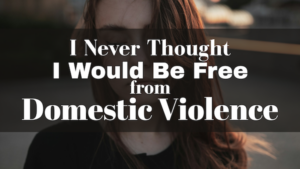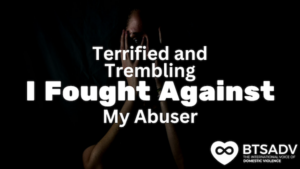Even though many have heard of Post-Traumatic Stress Disorder (PTSD), not many may have heard of C-PTSD. What is C-PTSD and how does it differ from PTSD? And why do domestic violence survivors suffer from C-PTSD?
What is C-PTSD?
Healthline defines Complex Post-Traumatic Stress Disorder (C-PTSD) as “repeated trauma over months or years, rather than a single event.”
But how and why is C-PTSD different from PTSD?
The differences
The one main difference between PTSD and C-PTSD is that PTSD is typically related to a singular traumatic event. As Mayo Clinic explains, PTSD is triggered by a terrifying event that brings upon flashbacks, nightmares and other symptoms.
Another difference that Healthline points out is that C-PTSD has additional symptoms to the ones that PTSD is known for. Such symptoms include:
- Lack of emotional regulation
- Changes in consciousness
- Negative self-perception
- Difficulty with relationships
- Distorted perception of the abuser
- Loss of systems of meanings
Domestic violence survivors and C-PTSD
The U.S. Department of Veterans Affairs suggests that those who experience and endure long-term domestic violence situations are most likely to develop C-PTSD due to being consistently exposed to trauma on a regular basis. “During long-term traumas, the victim is generally held in a protracted state of captivity, physically or emotionally,” the site states.
In a January 2020 article on Thought Catalog, Shahida Arabi wrote, “Complex PTSD, which develops due to chronic, ongoing trauma, is more likely to occur due to long-term domestic violence or childhood sexual and/or physical or emotional abuse.”
It is this ongoing trauma from domestic violence that can cause victims and survivors to experience significant damage to relationships and their quality of life. The reason that this ongoing abuse can cause damage to a survivor’s quality of life is because the abuser had such power and control over the survivor for so long that it could very well result in serious psychological harm.
Due to the ongoing trauma, many victims and survivors often feel like they died inside. It’s like they forget who they are. They were stripped of all that they knew. They lost themselves in that trauma. It would take intense therapy to reverse that and rediscover who they are.
Healing and recovery
It is possible to heal and recover from C-PTSD. It will take time though, as you cannot heal from something like this overnight. It can only be done with the help of a well-informed and highly trained therapist. There are several treatment methods available, but the use of any of these must be done under the guidance of the therapist.
Psychotherapy, or talk therapy, can be used in an individual setting or group therapy. Some forms of psychotherapy include:
- Cognitive Behavioral Therapy (CBT) – a type of psychotherapy that helps change thought patterns to improve mood and behavior. Learn more about CBT via this Healthline article.
- Prolonged Exposure Therapy (PET) – a type of specialized therapy that gradually exposes you to the traumas you faced. You can learn more about PET through this American Psychological Association article.
- Eye Movement Desensitization and Reprocessing (EMDR) – a type of therapy that has you focus on one traumatic memory while simultaneously focusing on an external stimuli. Read more about EMDR in an article that Break the Silence Against Domestic Violence published in August 2018.
In addition to talk therapy, medications have been known to help treat PTSD and C-PTSD symptoms. These medications can be used in conjunction with other forms of treatment. But please speak with your doctor to see if incorporating medication into your treatment plan is right for you.
As a reminder, the healing process will not be easy. It will likely be fraught with many ups and downs while you move through the process. But please know that it is possible to heal. Healing from trauma will take time. During this time, be gentle with yourself and allow yourself the time to heal.
If you or someone you know is in an abusive relationship, there is help. You can visit the Break the Silence Against Domestic Violence website at www.breakthesilencedv.org or chat with one of our helpline advocates at 855-287-1777.










